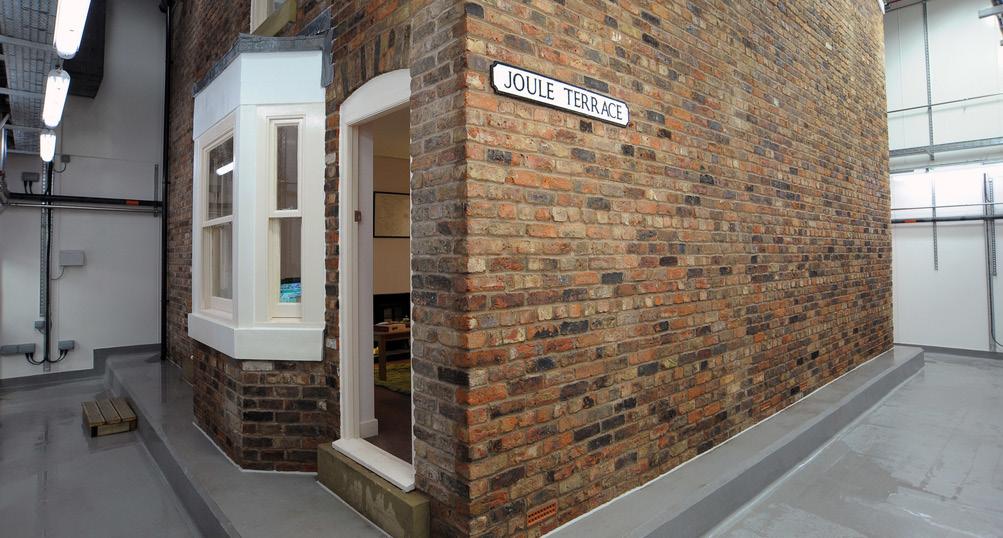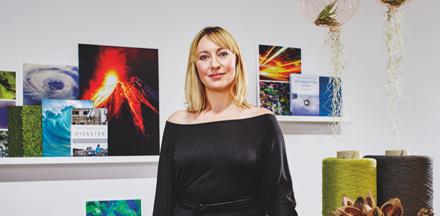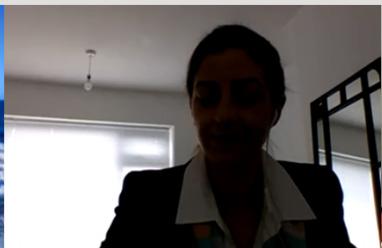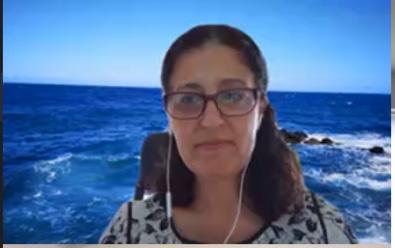
13 minute read
The latest news from your University
MANCHESTER MUSIC LEGEND SHARES WISDOM AND ANECDOTES WITH STUDENTS
Musician and DJ, Clint Boon left our students feeling inspired and entertained, when he visited the University in February. From hiring a young roadie called Noel Gallagher to curing hangovers with Shaun Ryder, Clint gave a special insight into his youth at the centre of the famed Madchester music scene as a member of the Inspiral Carpets. Clint, who was awarded an honorary degree by the University last year, is also a key supporter of the redevelopment of Maxwell Hall, a once infamous music venue in the heart of the University campus, that will be restored to its former glory as part of a multi-million pound investment plan. Clint said: “I want to raise awareness and help raise funds for the redevelopment of the iconic Maxwell Hall. I came to the Hall in 1985 to watch New Order supported by The Happy Mondays.“ Now a successful radio DJ, Clint is no stranger to hard work and over the years has earned a legion of fans, or the ‘Boon Army’ as they like to be called.
“Tenacity is really important,” he said. “And I’ve always said follow your soul and not your wallet. It’s okay to have a punk mentality – you don’t always have to follow what the establishment tells you.”
NEW TECHNOLOGY COULD HELP HOUSEHOLDERS SAVE ENERGY
Researchers at Salford have discovered a simple device made from recycled plastic can reduce household energy consumption by up to 16% and help to reduce carbon emissions. The team put Thermocill, a product made from plastic bottle tops and other recycled plastic above a radiator and under a window in Salford’s energy testing facility, Energy House. Through extensive testing the team discovered that the placement of the Thermocill redirected heat into the window recess rather than straight out into the room. By heating the room’s ‘thermal hole’, an area in the room that usually maintains a low temperature such as the window recess, the heat loss through the window significantly reduced, lowering energy consumption by up to 16% and increasing heat-up time by around 23%.

The team at Energy House plan to computer model Thermocill using the data to enhance its design, which will also optimise the product’s efficiency. They are also looking for a manufacturing partner or licensee to help take the product to the open market.
SALFORD AMONG BEST FOR ENTREPRENEURS
A new study has revealed that one in nine graduates from Salford go on to manage or start their own business, as we are named as one of the best universities in the north of England for entrepreneurial students.
The study, commissioned by Hitachi Capital Invoice Finance, involved 9.5 million former students in the UK and has revealed the universities with the highest numbers of students who go on to start their own or run a business, with Salford coming fifth in the north and 30th in the country overall.
Encouraging entrepreneurialism is one of the key missions at the University, with initiatives designed to provide opportunities for students and graduates perusing entrepreneurship. One such initiative is the Launch Business Incubator, which offers bespoke support for those who want to set up their own businesses. So far it has helped to set up over 60 businesses, from vegan food delivery services, to VR tech companies, to art and design studios.

SALFORD LEADING THE WAY IN DIGITAL SOCIAL WORK EDUCATION
The University’s Social Work Practice Learning Team have been recognised for an innovative new digital teaching model that is giving social work students on-the-job experience in a safe teaching environment. The team has been working with the Social Care Network (SCN) for five years to create The Salford Model. By integrating teaching materials with CHARMS, a digital application used by social care agencies across the UK and Ireland for case management, students can work on a simulated case on the very same technology they will be using once they qualify and enter practice. Gabi Hesk, Lecturer in Social Work and Practice Learning says: ‘Students have the chance to make mistakes here first. They can explore their case recording skills and receive great advice from lecturers and tutors ensuring best practice.’ The Salford Model has gained global attention, with institutions in the US getting in touch to find out how they can replicate the method for their own teaching.

BLOWING OUR OWN TRUMPET
Congratulations to the University’s brass band, who not only entered the prestigious UniBrass competition for the first time this year, they also won!
The title of Champion University Brass Band was awarded to the Salford band, which features students and alumni from the University alongside conductor Richard Harvey, Lecturer in Classical Music Performance & Conducting, at the annual competition that sees University brass bands compete against each other for the winning title. Alumna, Jessica Wilson said: “I was absolutely delighted to be asked to play at the Salford brass band’s debut performance at UniBrass. The band were just delighted to attend the competition, so to win was an amazing bonus! It was a massive team effort in which everyone played their part, and the moment we were announced as winners is one I’ll never forget.”

In March, as the world adapted to the many challenges of the COVID-19 pandemic, the University leapt into action to help support the fight against the virus.
Specialists at the University handed over a much-needed testing machine to the government, which helped them to run tens of thousands of tests per day. The Real-Time Polymerase Chain Reaction equipment, or RT-PCR, can detect as little as one virus particle in swabs taken from inside the mouth or nose. The ABI 7500 machine is normally used by University researchers looking into lung inflammatory and fibrotic diseases.
In addition to this, the University donated significant quantities of personal protective equipment (PPE) to Salford Royal NHS Foundation Trust. Biomedical science staff returned to campus following its closure to collect the much-needed equipment and deliver it to the local hospital. This included around 37,000 pairs of disposable gloves, over 500 lab coats, 100 pairs of safety glasses and 10 full body suits, as well as a supply of hand sanitiser after widespread reports of kit shortages in the NHS. The University’s Maker Space also geared up to support the health service. The Maker Space, a state-of-the-art engineering and digital fabrication facility, developed a prototype using the open-source Prusa design with feedback from Salford Royal Hospital. The design was sent out to commercial fabricators and university technical departments in the North West to scale production and meet the numbers needed for NHS frontline staff.

Professor Sheila Pankhurst, Dean of the School of Science, Engineering and Environment at the time, said: “I am so proud of the way in which University staff have stepped up to support our NHS at this vital time.
“When we put the call out for volunteers, we were inundated with staff wanting to help. We are all so grateful for all the work that the NHS is doing – and that includes many of our current students and alumni who work in these vital services – so this contribution is the least that we could do.”
As the NHS continued to manage the impact of the coronavirus, Salford students were at the heart of the health care response. Dozens of nursing, midwifery and final year biomedical science students and those on placements worked in hospitals across Salford and Greater Manchester to support the staff on site.
Many of our fantastic alumni have also been engaged in a range of activities in their communities. You can read more about this on page 16.

STUDENTS FROM ENGINEERING SCHOLARSHIP GRADUATE
This July saw the latest cohort of students from the Gerry Mason Engineering Excellence Scholarship complete their studies and graduate.
The scholarship, funded by the Morson Group, a key partner of the University, provides engineering students the support they need to complete their degree.
The University began the scholarship programme in 2015 and has seen over 35 graduating scholars.
Ged Mason OBE, CEO of the Morson Group, said: “Our longstanding partnership with the University of Salford is delivering significant change as we work collaboratively to attract new “The scholarship was founded in my late father’s name, as it was his drive and ambition to engage with local young people and provide highly-skilled career pathways regardless of socioeconomic background, gender, race and more – a core value that still rings true within Morson today.
One student who received this scholarship was Mujtaba Ghulam, who studied for a bachelor’s degree in Petroleum and Mechanical Engineering.
Mujtaba said: “From the bottom of my heart, I want to express my gratitude and say a massive thank you to the Mason family as well as the Morson group for their continued support over the past three years. They have not only made talent and develop the next generation of trailblazers.
completing my degree possible, but they have provided many opportunities along the way that have supported my learning and development in the world of engineering.”

BLACK HISTORY MONTH 2020
In October, the University marked Black History Month with a series of events aimed at highlighting issues faced by members of black and minority ethnic groups and celebrated the diverse voices within our community. Curated by the School of Health & Society, with the theme ‘Shining a Light on our Remarkable Black and Asian Staff & Students’, the stories of our Black and Asian staff and students were broadcasted across the University to create sustained awareness of their strong, courageous and remarkable contribution to the diversity of our community.

The series of events examined the issues of racism in football, support for refugees and asylum seekers, healthcare for black women and the #BlackLivesMatter movement.
OUR INSPIRATIONAL ALUMNAE WORKING IN STEM SHARE THEIR EXPERIENCES OF WORKING THROUGH A PANDEMIC ON INTERNATIONAL WOMEN IN ENGINEERING DAY
In early 2020, as the UK and many other countries were in the midst of a national lockdown, emerging research began to suggest that the need to work from home and the closure of schools forced many women into a position where juggling their professional and family lives meant they faced extraordinary pressure.
According to a study from the Office for National Statistics, women in households with children under the age of 18 carried out an average of more than three hours a day of childcare compared to just two hours for men during the lockdown. Many were forced to work ‘in the margins’, either starting work incredibly early or finishing late as they care for their families in the daytime.
This was particularly concerning for all sectors, but in the science, technology, engineering and mathematics (STEM) industries, where women are already underrepresented and under-promoted, the lockdown had the potential to turn back the clock on hard-won equality gains.
Professor Haifa Takruri-Rizk from the School of Science & Engineering, an advocate for women working in STEM industries, saw an opportunity to address these issues by bringing together a group of inspirational women from across the STEM sector to discuss these issues in an online panel session, coinciding with International Women in Engineering Day on 23 June.
Professor Takruri-Rizk said: "It is important for women to know that there is support out there, they are not alone and that they can survive in a sector that is still associated with being male dominated.”
The speakers, most of whom were Salford graduates, included experts from engineering and related disciplines and women working across a wide breadth of sectors from architecture to pharmaceuticals. Our panel was also global, with technology enabling us to connect with speakers all over the world at the click of a button.
Some of our speakers spoke of the opportunity the pandemic gave them to take time out from busy work and travel schedules.
KARIMA ES SABAR, CEO AND PARTNER AT QUARK VENTURE IN CANADA:
“I have always been involved in international business, which is why the Covid pandemic changed my life, because for the last 30 years all I’ve done is get on and off planes. I can’t remember a time where I’ve had three months consecutively without going on a plane. I can say it’s been a wonderful experience to be grounded and to be at home with my family.”
Karimah Es Sabar

However, working from home has also raised challenges.
HELEN SHELDON, ASSOCIATE AT RBA ACOUSTICS:
“The prevailing feeling has been guilt. When I’m trying to work, I feel guilty that I’m not doing a good enough job, because I’m being interrupted. But I’m also feeling guilty because I’m not spending time with my children.”
“I’m trying to come to terms with the constant juggle and enjoy the time that I am able to spend with my children. It’s hard but there are definitely positives to be taken from it.” Panel members spoke of finding new ways of working that work for you.
DR SHAFAQ KHAN, ASSISTANT PROFESSOR IN COMPUTER SCIENCE AT ZAYED UNIVERSITY IN THE UAE:
“I realised for this to work there had to be rules. There had to be discipline in my life. I had to sleep no matter what, at least seven hours, and I had to get up early in the morning.”
DR DIANA KENNEDY, HONORARY DOCTORATE AND VICE PRESIDENTOF STRATEGY, ARCHITECTURE AND PLANNING AT BP:
“The real blurring of home and work has actually been a real challenge, the intensity of calls and the relentlessness of them, due to the lack of those casual encounters that we would previously have had around the water cooler or the coffee machine."
“The natural tendency of us, women particularly, to work harder and longer, means the days are very long and intense. I think I, on a personal level, have learned a lot about myself and how I work, and from my colleagues too and sharing experiences.”
Home working has been a great equaliser, with many panellists commenting on how relationships with colleagues have improved and some even finding the confidence to seek new opportunities.
DR SARA BISCAYA , LECTURER IN ARCHITECTURE AT UNIVERSITY OF SALFORD:
“I’ve gained the confidence with people that I wouldn’t normally have the courage to contact in regards to my research. Now that I’m online and, that we’re all under this strange situation, it gave me that leap of faith. So, I went for it and the results have been quite nice to see.” Our experts spoke of knowing their value and making sure they are not taken advantage of professionally.
DR MELISSA STERRY, DESIGN SCIENTIST, SYSTEMS THEORIST AND FUTURIST:

“What I’ve noticed in industry is that pressure on women to work at lower rates and give more of themselves for free. If you are a specialist in any of the areas that are particular to this crisis, your value is higher. That is something all of us in our own individual capacity have some agency to address.”
Dr Melissa Sterry

With the impact of the pandemic far from over, our experts look to the future and what comes next.
KARIMA ES SABAR:
“We all need to think beyond Covid-19, because we’ve all been having other crises that we’ve been ignoring. The mental health crisis, the chronic disease crisis, the climate crisis - all of these things are now becoming accentuated and reversely they accentuate the Covid-19 pandemic. I’m busier than I’ve ever been.”

Thank you to those alumni who joined our panel and all who logged in to participate in the event.













